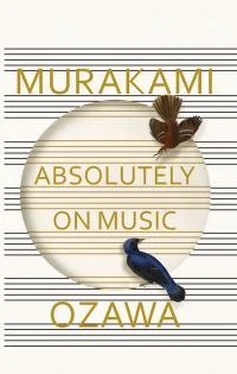As much as I have loved music over the years, I never received a formal musical education, have virtually no technical knowledge of the field, and am a complete layman where most things musical are concerned. During our conversations, some of my comments may have been amateurish or even insulting, but Ozawa is not the sort of person to let such things bother him. He gave each remark serious thought and responded to each question, for which I was tremendously grateful.
I handled the tape recorder, transcribed our conversations myself, and presented the manuscript to him for corrections.
“Come to think of it, I’ve never really talked about music like this before, in such a focused, organized way.” This was the very first thing Ozawa said to me after reading the finished manuscript. “But wow, my language is so rough! Do you think readers are going to understand what I’m saying?”
It’s true, the maestro does speak his own special brand of Ozawa-ese, which is not always easy to convert to standard written Japanese. He gesticulates grandly, and many of his thoughts emerge in the form of songs. Still, whatever “roughness” there may be in the way he expresses himself, the feeling he seeks to convey comes through with startling immediacy, overarching the “wall of words.”
Despite being an amateur (or perhaps because of it), whenever I listen to music, I do so without preconceptions, simply opening my ears to the more wonderful passages and physically taking them in. When those wonderful passages are there, I feel joy, and when some parts are not so wonderful, I listen with a touch of regret. Beyond that, I might pause to think about what makes a certain passage wonderful or not so wonderful, but other musical elements are not that important to me. Basically, I believe that music exists to make people happy. In order to do so, those who make music use a wide range of techniques and methods which, in all their complexity, fascinate me in the simplest possible way.
I tried my best to preserve this attitude when listening to what Maestro Ozawa had to say. In other words, I tried my best to remain an honest and curious amateur listener on the assumption that most of the people reading this book would be amateur music fans like me.
At the risk of sounding somewhat presumptuous, I confess that in the course of our many conversations, I began to suspect that Seiji Ozawa and I might have several things in common. Questions of talent or productivity or fame aside, what I mean here is that I can feel a sense of identity in the way we live our lives.
First of all, both of us seem to take the same simple joy in our work. Whatever differences there might be between making music and writing fiction, both of us are happiest when absorbed in our work. And the very fact that we are able to become so totally engrossed in it gives us the deepest satisfaction. What we end up producing as a result of that work may well be important, but aside from that, our ability to work with utter concentration and to devote ourselves to it so completely that we forget the passage of time is its own irreplaceable reward.
Secondly, we both maintain the same “hungry heart” we possessed in our youth, that persistent feeling that “this is not good enough,” that we must dig deeper, forge farther ahead. This is the major motif of our work and our lives. Observing Ozawa in action, I could feel the depth and intensity of the desire he brought to his work. He was convinced of his own rightness and proud of what he was doing, but not in the least satisfied with it. I could see he knew he should be able to make the music even better, even deeper, and he was determined to make it happen even as he struggled with the constraints of time and his own physical strength.
The third of our shared traits is stubbornness. We’re patient, tough, and, finally, just plain stubborn. Once we’ve decided to do something in a certain way, it doesn’t matter what anybody else says, that’s how we’re going to do it. And even if, as a result, we find ourselves in dire straits, possibly even hated, we will take responsibility for our actions without making excuses. Ozawa is an utterly unpretentious person who is constantly cracking jokes, but he is also extremely sensitive to his surroundings, and his priorities are clear. Once he has made his mind up, he doesn’t waver. Or at least that is how he appears to me.
I have met many different people in the course of my life, some of whom I have come to know pretty well, but where these three traits are concerned, I had never encountered anyone before Seiji Ozawa with whom I found it so easy and natural to identify. In that sense, he is a precious person to me. It sets my mind at ease to know that there is someone like him in the world.
Of course, we are also different in many ways. For example, I lack his easy sociability. I do have my own sort of curiosity about other people, but in my case it rarely comes to the surface. As a conductor of orchestras, Ozawa is quite naturally in touch with a large number of people on a daily basis and has to act as the guiding member of a team. But no matter how talented he might be, people would not follow him if he were constantly moody and difficult. Interpersonal relations take on a great significance. A conductor needs like-minded musical colleagues, and he is often called upon to perform social and even entrepreneurial tasks. He has to give much thought to his audiences. And as a musician, he has to devote a good deal of energy to the guidance of the next generation.
By contrast, as a novelist I am free to spend my life hardly seeing or talking to anyone for days at a time, and never appearing in the media. I rarely have to do anything that involves teamwork, and while it’s best to have some colleagues, I don’t especially need any. I just have to stay in the house and write—alone. The thought of guiding the next generation has never crossed my mind, I’m sorry to say (not that anyone has ever asked me to do such a thing). I’m sure there are significant differences in mentality that come from such differences in our professional functions, not to mention innate personality differences. But I suspect that on the most basic level, deep down in the bedrock, our similarities outnumber our differences.
Creative people have to be fundamentally egoistic. This may sound pompous, but it happens to be the truth. People who live their lives watching what goes on around them, trying not to make waves, and looking for the easy compromise are not going to be able to do creative work, whatever their field. To build something where there was nothing requires deep individual concentration, and in most cases that kind of concentration occurs in a place unrelated to cooperation with others, a place we might even call dämonisch.
Still, letting one’s ego run wild on the assumption that one is an “artist” will disrupt any kind of social life, which in turn interrupts the “individual concentration” so indispensable for creativity. Baring the ego in the late nineteenth century was one thing, but now, in the twenty-first century, it is a far more difficult matter. Creative professionals constantly have to find those realistic points of compromise between themselves and their environment.
What I am trying to say here is that while Ozawa and I of course have found very different ways to establish those points of compromise, we are likely headed in pretty much the same direction. And while we may set very different priorities, the way we set them may be quite similar. Which is why I was able to listen to his stories with something more than mere sympathy.
Ozawa is a thoroughly honest person who is not given to pleasantries just to make himself look good. And even now, past the age of seventy-five, he retains qualities that you know have been with him since birth. He answered most of my questions candidly and at length. That should be clear to anyone who reads this book. Of course, there were many things he chose not to talk about for one reason or another, some of which I could guess at and some of which I could not. With regard to both the spoken and the unspoken, in all cases, however, I felt a strong sense of identification.
Читать дальше











